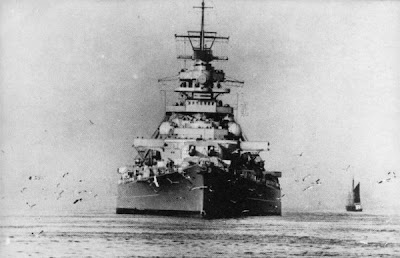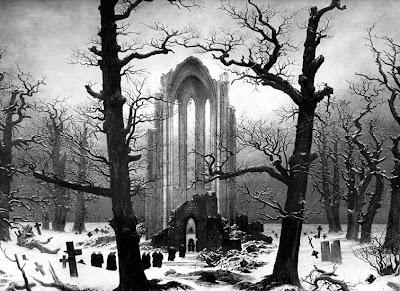Saturday, 15 August 2009
An optimistic view of War
Into Battle
The naked earth is warm with Spring
And with green grass and bursting trees
Leans to the Sun’s gaze glorying
And quivers in the sunny breeze;
And Life is Colour and Warmth and Light,
And striving evermore for these;
And he is dead who will not fight;
And who dies fighting has increase.
The fighting man shall from the sun
Take warmth, and life from the glowing earth
Speed with the lightfoot winds to run,
And with the trees to newer birth;
And find when fighting shall be done,
Great rest, and fulness after dearth
All the bright company of Heaven
Hold him in their high comradeship,
The Dog Star and the Sisters Seven,
Orion's Belt and sworded hip.
The woodland trees that stand together,
They stand to him each one a friend;
They gently speak in the windy weather;
They guide to valley and ridges' end.
The kestrel hovering by day,
And the little owls that call by night,
Bid him be swift and keen as they,
As keen of ear, as swift as sight.
The blackbird sings to him:
'Brother, brother, If this be the last song you shall sing,
Sing well, for you may not sing another;
Brother, sing!'
In dreary, doubtful, waiting hours
Before the brazen frenzy starts,
The horses show him nobler powers;
O patient eyes, courageous hearts!
And when the burning moment breaks,
And all things else are out of mind,
And only Joy of Battle takes
Him by the throat and makes him blind,
Through joy and blindness he shall know,
Not caring much to know, that still
Nor lead nor steel shall reach him, so
That it be not the Destined Will.
The thundering line of battle stands,
And in the air Death moans and sings;
But Day shall clasp him with strong hands,
And Night shall fold him in soft wings.
Saturday, 11 July 2009
Winter in Surrey
Wednesday, 27 May 2009
68 years ago today


This is the German battleship Bismarck, which was sunk by the Royal Navy on 27 May 1941. The ship had a brief career - sent out on a sortie to attack Allied shipping in the Atlantic, it almost immediately sank the battlecruiser HMS Hood in the Battle of Denmark Strait - in this picture Bismarck is seen firing just afterwards, at Hood's companion ship HMS Prince of Wales.
Bismarck was then hunted down by many Royal Navy ships, and after its steering was crippled by an air strike, was sunk on 27 May in an action lasting three hours, with the loss of most of its crew of over 2,000 men. This photo shows it under fire in its last moments before sinking.

The commander of the Royal Navy fleet, Admiral Sir John Tovey, said 'The Bismarck had put up a most gallant fight against impossible odds worthy of the old days of the Imperial German Navy, and she went down with her colours flying'
Monday, 11 May 2009
Romantic Ruins

This painting is Monastery Graveyard in Snow, by the German Romantic artist Caspar David Friedrich. His subjects were often like this - images of abbeys, forests and so on against a romanticised landscape. In this picture, monks process through a graveyard to enter the ruins of their abbey. It is an apparently bleak vision but ultimately an uplifting one of faith and hope.
The painting was destroyed in the allied bombing of Berlin in 1945.
Sunday, 10 May 2009
The end............

This is a NASA artist's impression of a red dwarf star. Our Sun's fate is to turn from a main sequence yellow star into a red dwarf, having first swollen considerably and destroying all life on Earth. When that happens, unless we have managed to quit this place for elsewhere, the words of a past prime Minister of Great Britain, Arthur Balfour, will come to pass:
Man, so far as natural science by itself is able to teach us, is no longer the final cause of the universe, the Heaven-descended heir of all the ages. His very existence is an accident, his story a brief and transitory episode in the life of one of the meanest of the planets. Of the combination of causes which first converted a dead organic compound to the living progenitors of humanity, science, indeed, as yet knows nothing. It is enough that from such beginnings famine, disease, and mutual slaughter, fit nurses of the future lords of creation, have gradually evolved, after infinite travail, a race with conscience enough to feel that it is vile, and intelligence enough to know that it is insignificant. We survey the past, and see that its history is of blood and tears, of helpless blundering, of wild revolt, of stupid acquiescence, of empty aspirations. We sound the future, and learn that after a period, long compared with the individual life, but short indeed compared with the divisions of time open to our investigation, the energies of our system will decay, the glory of the sun will be dimmed, and the earth, tideless and inert, will no longer tolerate the race which has for a moment disturbed its solitude. Man will go down into the pit, and all his thoughts will perish. The uneasy consciousness, which in this obscure corner has for a brief space broken the contented silence of the universe, will be at rest. Matter will know itself no longer. 'Imperishable monuments' and 'immortal deeds', death itself, and love stronger than death will be as though they had never been. Nor will anything that is be better or worse for all that the labour, genius, devotion, and suffering of man have striven through countless generations to effect.
From Chapter I of The Foundations of Belief by Arthur Balfour
Saturday, 9 May 2009
Ruralists

This painting is by Annie Ovenden and is entitled Storm Gathering Over St German's. Ms Ovenden and her husband were members of the Brotherhood of Ruralists, a distinctly English group of painters who depicted nature in a very special way - not naturalistic but with a very keen eye for the feel of a place. Although no longer in formal existence, the group still has a website here. There is also a good book about their work, which is listed on Amazon here.
Gentlemen at leisure
Friday, 8 May 2009
Tribute to Oscar Wilde

Depending on which account you read, the relationship between the Anglo-Irish playwright Oscar Wilde and his friend Lord Alfred 'Bosie' Douglas (above) seems either quite unpleasant or a thing of poetic beauty. It put Wilde into prison in 1895, where he wrote a long letter of recrimination ('De Profundis'). Their contact afterwards was sporadic, although Douglas was chief mourner at Wilde's funeral in Paris. After Wilde's death Douglas put a lot of effort into rewriting the relationship. But whatever his subsequent denials, the poem he wrote shortly after Wilde's death is a moving and beautiful tribute to Wilde's immense talent:
All radiant and unshadowed of distress,
And as of old, in music measureless,
I heard his golden voice and marked him trace
Under the common thing the hidden grace,
And conjure wonder out of emptiness,
Till mean things put on beauty like a dress
And all the world was an enchanted place.
And then methought outside a fast locked gate
I mourned the loss of unrecorded words,
Forgotten tales and mysteries half said,
Wonders that might have been articulate,
And voiceless thoughts like murdered singing birds.
And so I woke and knew that he was dead.







